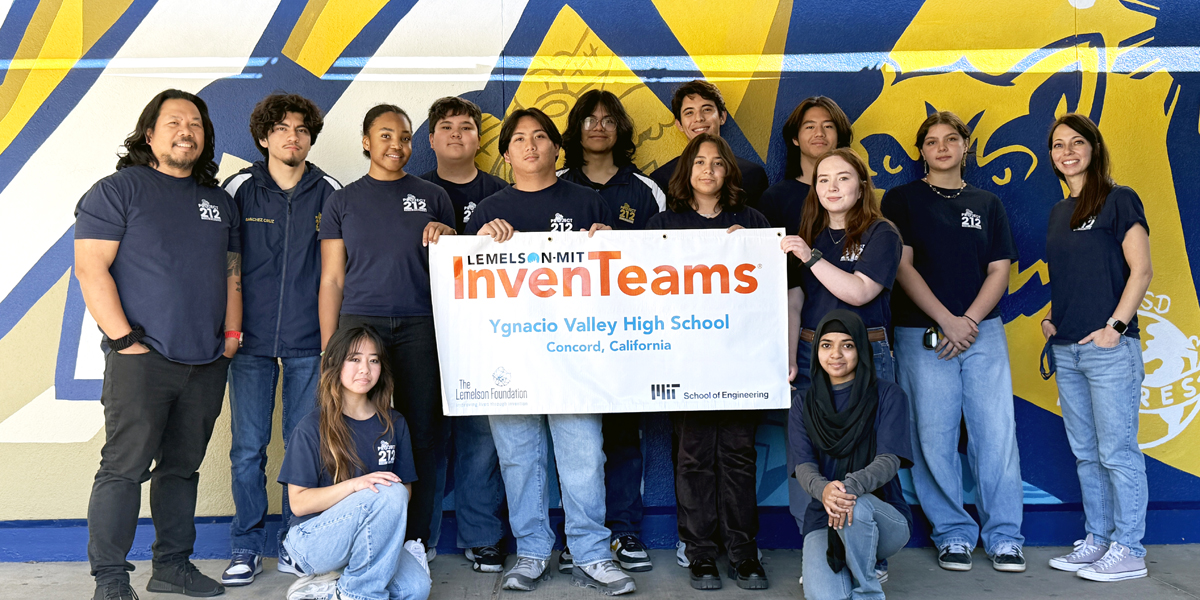Ygnacio Valley High students receive Invention Grant to create technological solution to real-world problem

CONCORD, CA (Oct. 25, 2024) — Ygnacio Valley High School has been awarded a Lemelson-MIT InvenTeam® grant of $7,500. The money goes toward the creation of an invention geared towards helping people with limited hand mobility. This will help those people regain their independence and reconnect with loved ones and their community. Ygnacio Valley is one of only eight high schools nationwide that InvenTeam selected this year, and it is the only school in California to earn this honor.
The Ygnacio Valley High InvenTeam is inventing a solution to assist those with limited ability to use their hands—whether due to arthritis, cerebral palsy or other conditions—to overcome challenges in their daily lives, such as gripping utensils or using hand gestures to communicate.
With more than 50 million adults in the U.S. affected by arthritis and 764,000 people living with cerebral palsy, these challenges are widespread. They can become frustrating struggles, leading to feelings of isolation. The Ygnacio Valley group is developing an innovative solution to empower people with limited hand mobility.
Teachers
Joseph Alvarico, a 2024 California Teacher of the Year who teaches engineering and robotics at the Concord high school, initiated the InvenTeam application process during the summer and worked with his students to prepare the final proposal. A respected panel of university professors, inventors, entrepreneurs, industry professionals and college students including former InvenTeam members now working in industry selected the grantees.
The InvenTeam will also work with Ygnacio Valley math teacher Tabatha Box, who is part of the school’s International Baccalaureate staff and will help guide the students through the development of their invention.
Outside mentors
The team also hopes to attract outside mentors in the field of technology and/or Augmentative and Alternative Communication support. “We are starting to tell people about what we’re trying to do in the hopes of getting mentors, in-kind donations or monetary support for this project,” Alvarico said, noting that the grant will not cover all of the group’s expenses.
By the end of the project, Alvarico said, “the students should have a solid idea of how to make a product that could be sold.” And they may have the opportunity to apply for a patent. He hand-picked the 12 members. These include male and female students in grades 9-12. Many of the students also belong to the after-school robotics club Alvarico advises. They have taught robotics to middle school students and participate in dual enrollment engineering classes for which they are earning college credit through Diablo Valley College.
After hearing about the grant program last year, Alvarico said: “I thought it would be really cool for students from Ygnacio Valley, with limited resources from low socioeconomic backgrounds to have the same opportunities that other students do. So we are making this a vehicle not just to help the community, but for the kids to see what’s outside of California.
“When I visited MIT last summer, I could really tell that these students could make it there, too. The students will stay at MIT and plan to visit Harvard. We’re going to try to raise some money to go on a college tour to New York and visit Columbia, NYU and Cornell.”
Solving problems
Over the next eight months, the Ygnacio Valley InvenTeam will develop a solution to the problem. The team will build a working prototype that will appear at a technical review in February. Then the final prototype will appear during EurekaFest.® This invention celebration takes place June 9-11, 2025, at Massachusetts Institute of Technology in Cambridge.
“The InvenTeams focus on solving problems that impact their local communities,” says Leigh Estabrooks, Lemelson-MIT’s Invention Education Officer. “Teams focus their technological solutions — their inventions — on inequities in health and wellbeing, environmental issues, and safety concerns. These high school students are not just problem-solvers of tomorrow, they are problem solvers today helping to make our world more equitable, healthier and safer.”
Intellectual property
The InvenTeams initiative, now in its 21st year, has enabled 18 teams of high school students to earn U.S. patents for their projects. Intellectual property education is combined with their invention education offerings. This comes as part of the Lemelson-MIT Program’s deliberate efforts to remedy historic inequities among those who develop inventions. They also work to protect their intellectual property, and commercialize their creations.
The ongoing efforts empower students from all backgrounds, equipping them with invaluable problem-solving skills. These will serve them well throughout their academic journeys, professional pursuits, and personal lives. The work with 4,049 students across 304 different teams nationwide the past 21 years includes.
- Partnering with intellectual property law firms to provide pro bono legal support.
- Collaborating with industry-leading companies that provide technical guidance and mentoring
- Providing professional development for teachers on invention education and IP.
- Assisting teams with identifying resources within their communities’ innovation ecosystems to support ongoing invention efforts.
- Publishing case studies and research to inform the work of invention educators and policy makers. Also to build support for engaging students in efforts to invent solutions to real-world problems.
The Lemelson-MIT Program is a national leader in efforts to prepare the next generation of inventors and entrepreneurs. Their work focuses on the expansion of opportunities for people to learn ways inventors find and solve problems to improve lives. Their commitment to diversity, equity and inclusion aims to remedy historic inequities among those who develop inventions. It also seeks to protect their intellectual property and commercialize their creations.
Jerome H. Lemelson, a prolific inventor, and his wife Dorothy founded the Lemelson-MIT Program at MIT in 1994. The funds come from The Lemelson Foundation and are administered by the School of Engineering at MIT.
For more information, visit Lemelson.MIT.edu.
